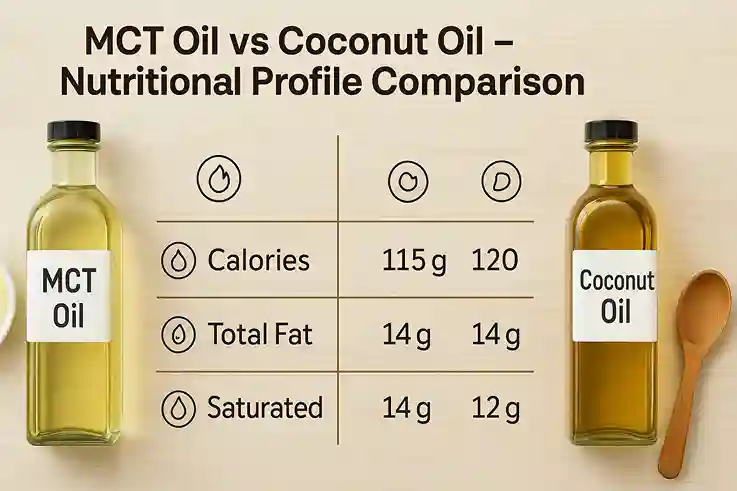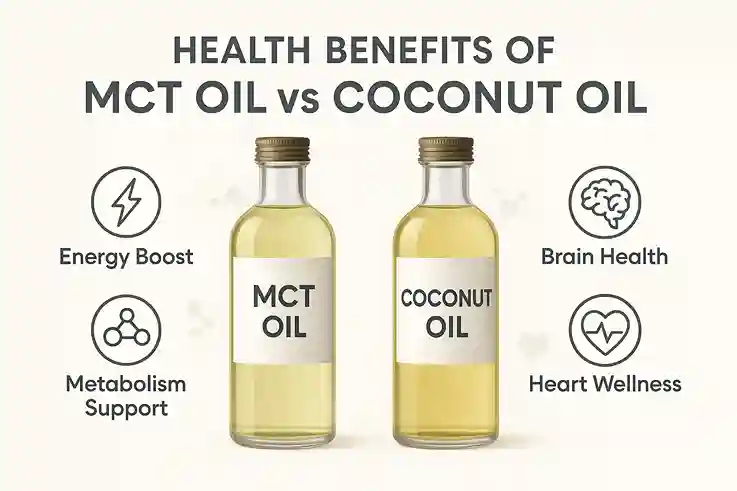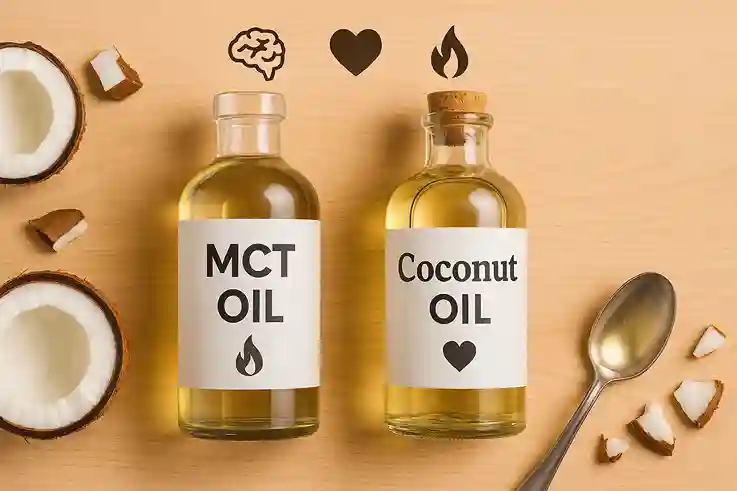MCT Oil vs Coconut Oil is often debated in nutrition and wellness circles. At first glance, they may appear almost identical. Both come from coconuts, both are rich in fat, and both carry impressive health claims. However, their benefits, uses, and effects differ in important ways. This is exactly where the confusion begins.
Many people assume coconut oil is the same as MCT oil. In reality, coconut oil contains only some MCTs, while MCT oil is a concentrated extract. As a result, your body digests and uses them differently. MCT oil provides fast, efficient energy, while coconut oil delivers a broader fat profile with steadier effects.
Because of these differences, opinions about which oil is “better” vary widely. For instance, some prefer MCT oil for quick fuel, while others rely on coconut oil for cooking or skincare. Meanwhile, marketing often complicates the decision, making it harder to separate fact from hype.
In this guide, you’ll clearly see how MCT oil and coconut oil compare. You’ll discover how they work in the body, when each one shines, and where they fall short. By the end, you’ll know which oil best matches your health and lifestyle goals.
“Not all fats are created equal—understanding the difference is the first step to using them wisely.”
MCT Oil vs Coconut Oil

To understand the debate on MCT Oil vs Coconut Oil, it helps to define both clearly. Coconut oil is a natural fat pressed from the meat of mature coconuts. It contains a mix of different fatty acids, including small, medium, and long-chain triglycerides. Most of the fat is saturated, with lauric acid making up the largest share.
MCT oil, on the other hand, is not simply coconut oil in a bottle. It is a refined extract. Manufacturers take coconut oil—or sometimes palm kernel oil—and separate the medium-chain triglycerides from the other fats. The result is a concentrated oil, usually containing only caprylic acid (C8) and capric acid (C10). These shorter chains are easier for the body to break down and use as energy.
The key difference lies in concentration. Coconut oil naturally contains about 55–65% MCTs, but it also has other fats that slow digestion. MCT oil delivers nearly 100% medium-chain triglycerides. That makes it faster to absorb and metabolize.
So while both oils start with coconuts, their makeup is not the same. One is whole and versatile, while the other is highly specialized for quick fuel and performance.
Nutritional Profile Comparison
Calories and Fat Composition Breakdown
When comparing MCT Oil vs Coconut Oil, both provide similar calories per tablespoon—around 115 to 120. Nearly all of those calories come from fat. However, the types of fat set them apart. Coconut oil contains a mix of medium-chain and long-chain fatty acids. About half of its fat comes from lauric acid, a medium-chain fat with unique properties. MCT oil, in contrast, is almost entirely made up of caprylic (C8) and capric acid (C10). These are shorter medium-chain triglycerides that the body quickly converts into energy.

How MCT Oil Differs from Whole Coconut Oil
MCT oil is a concentrated product. It strips away the long-chain fats and even most of the lauric acid. This makes it easier for the body to absorb and use right away, similar to how carbs provide fast fuel. Coconut oil, being less refined, offers a broader range of fatty acids. That slower digestion may provide steadier energy, though it lacks the rapid metabolic boost that MCT oil is known for.
Lauric Acid’s Unique Role in Coconut Oil
Lauric acid makes coconut oil stand out. Unlike shorter MCTs, lauric acid behaves more like a long-chain fat during digestion. That means it takes longer to break down. Still, research shows it may have antimicrobial properties that support immune health. This dual role—part medium, part long-chain—gives coconut oil a unique nutritional profile not found in pure MCT oil.
Nutritional Profile Comparison
| Aspect | MCT Oil | Coconut Oil |
|---|---|---|
| Calories per Tbsp | 115–120 | 115–120 |
| Fat Composition | Nearly 100% medium-chain triglycerides (MCTs) | Mix of medium- and long-chain fats |
| Main Fatty Acids | Caprylic acid (C8), Capric acid (C10) | Lauric acid (~50%), plus other long-chain fats |
| Digestion Speed | Very fast absorption and energy use | Slower digestion, steadier energy release |
| Unique Feature | Concentrated, refined for quick energy | Lauric acid offers antimicrobial benefits |
Health Benefits of MCT Oil vs Coconut Oil
Energy and Metabolism Support
When comparing MCT Oil vs Coconut Oil, energy is one of the biggest differences. MCT oil delivers rapid fuel because your body absorbs medium-chain fats quickly. Therefore, athletes often use it for instant energy before workouts. Coconut oil, however, digests more slowly. As a result, it may provide longer-lasting energy throughout the day.

Brain Health and Cognitive Performance
MCT oil has been studied for brain support. Because it turns into ketones quickly, it can supply the brain with an alternative energy source. This effect may help with focus, clarity, and even memory in some cases. Coconut oil also contains MCTs, but at a lower concentration. Thus, the impact on cognitive performance is less pronounced.
Digestive Benefits and Gut Health Differences
MCT oil tends to be easier on digestion, since it bypasses some of the usual fat-processing steps. For that reason, it’s often recommended for people with digestive concerns. Coconut oil, by contrast, contains lauric acid, which has antimicrobial properties. That may support gut health by fighting harmful bacteria. Still, too much coconut oil can cause discomfort for sensitive stomachs.
Skin and Hair Care Potential
Both oils can support beauty routines, though in different ways. Coconut oil is often applied directly to skin and hair because it moisturizes and reduces dryness. Meanwhile, MCT oil is lighter and less greasy, making it suitable for sensitive skin. Moreover, some people prefer MCT oil for blending into lotions or serums.
Health Benefits of MCT Oil vs Coconut Oil
| Benefit | MCT Oil | Coconut Oil |
|---|---|---|
| Energy & Metabolism | Rapid fuel, quickly absorbed, boosts workout performance | Slower digestion, steadier energy release |
| Brain Health | Converts to ketones fast, supports focus and clarity | Lower ketone impact, mild cognitive support |
| Digestive & Gut Health | Easier digestion, suitable for sensitive stomachs | Lauric acid fights harmful bacteria, but may cause discomfort |
| Skin & Hair Care | Light texture, blends well in lotions and serums | Rich moisturizer, reduces dryness when applied directly |
Which Oil Supports Weight Loss Better?

Quick Energy vs Sustained Satiety
When considering MCT Oil vs Coconut Oil for weight loss, energy release is key. MCT oil provides immediate energy because it is absorbed and burned quickly. This rapid effect may help curb cravings and reduce snacking. Coconut oil, however, digests more slowly. Therefore, it may provide longer satiety, keeping you full for longer periods.
How MCTs Affect Fat Burning
MCT oil is often linked to fat burning. Because it turns into ketones faster, it encourages the body to use fat for energy. Several studies show that MCTs may slightly boost metabolism. Coconut oil does contain MCTs, but in smaller amounts. Consequently, it has less impact on fat-burning potential compared to pure MCT oil.
Practical Examples of Use for Weight Control
People trying to lose weight often add MCT oil to coffee or smoothies. The quick energy may reduce the desire for sugary snacks. Meanwhile, coconut oil is commonly used for cooking. Adding it to meals may improve satiety, preventing overeating. However, portion control is important for both oils. After all, they are calorie-dense fats.
Weight Loss Comparison
| Aspect | MCT Oil | Coconut Oil |
|---|---|---|
| Energy Release | Quick, immediate fuel | Slower, steadier fuel |
| Impact on Fat Burning | Higher, boosts ketone production and metabolism | Lower, contains fewer pure MCTs |
| Satiety Effect | May reduce cravings with rapid energy | Provides longer fullness due to slower digestion |
| Common Use | Coffee, smoothies, pre-workout energy | Cooking, baking, meal prep |
Side Effects and Safety Concerns
Digestive Issues with Too Much MCT Oil
Although MCT oil is popular, it can cause problems when overused. Because the body absorbs it so quickly, large doses may trigger stomach cramps, nausea, or diarrhea. Therefore, it’s best to start with small amounts—about one teaspoon—and increase gradually. This approach gives your digestive system time to adjust.
Saturated Fat Concerns with Coconut Oil
Coconut oil has its own safety concerns. While it contains beneficial lauric acid, it is still high in saturated fat. Too much saturated fat may raise LDL cholesterol in some people. As a result, health experts recommend moderation. Using coconut oil occasionally for cooking is fine, but relying on it as a primary fat source may not be ideal.
How Much Is Safe to Consume Daily
Both oils can be safe when used wisely. For MCT oil, one to two tablespoons per day is usually well tolerated. For coconut oil, up to two tablespoons per day fits within a balanced diet. However, individual needs vary. People with digestive sensitivities or cholesterol concerns should consult a healthcare professional before increasing intake.
Safety Comparison
| Aspect | MCT Oil | Coconut Oil |
|---|---|---|
| Digestive Issues | May cause cramps, nausea, diarrhea if taken in excess | Usually tolerated, but large amounts may upset stomach |
| Fat Concerns | Refined, not linked to cholesterol directly | High in saturated fat, may raise LDL levels |
| Safe Daily Intake | 1–2 tablespoons per day | 1–2 tablespoons per day |
| Special Considerations | Start with small amounts to avoid stomach upset | Use in moderation to manage cholesterol levels |
Cost and Availability
Price Difference Between MCT Oil and Coconut Oil
When comparing MCT Oil vs Coconut Oil, price is one of the biggest differences. MCT oil is usually more expensive because it goes through additional processing. A typical 16-ounce bottle may cost between $15 and $25. Coconut oil, however, is much cheaper. A large jar often costs $6 to $10, making it a more budget-friendly choice for families.
Shelf Life and Storage
MCT oil has a long shelf life when stored in a cool, dark place. It doesn’t harden in cooler temperatures and stays liquid year-round. Coconut oil, by contrast, naturally solidifies below 76°F. While this is not harmful, it can be inconvenient when cooking. Still, both oils can last up to two years if sealed and stored properly.
Accessibility in U.S. Markets
In the United States, coconut oil is widely available. You can find it in supermarkets, discount stores, and even bulk retailers. MCT oil, however, is more specialized. It is often stocked in health food stores, supplement aisles, or sold online. Because of this, coconut oil is more accessible to the average shopper. MCT oil, although pricier, is gaining popularity and becoming easier to find.
Cost and Availability Comparison
| Aspect | MCT Oil | Coconut Oil |
|---|---|---|
| Price | $15–$25 for 16 oz | $6–$10 for large jar |
| Shelf Life | Up to 2 years, stays liquid | Up to 2 years, solidifies below 76°F |
| Storage Needs | Cool, dark place, easy to use | Same storage, but texture changes |
| Availability (U.S.) | Health food stores, supplements, online | Widely available in supermarkets, bulk |
MCT Oil vs Coconut Oil: Which One Should You Choose?
Athletes and Active Lifestyles
If you’re an athlete or someone with a busy, active schedule, MCT oil may suit you better. Because it absorbs quickly, it provides rapid energy before or after workouts. Therefore, many people blend it into coffee or smoothies for a quick boost. Coconut oil, while nutritious, won’t give the same immediate energy response.
Dieters and Weight Management
For those focusing on weight loss, MCT oil may also have the edge. Studies suggest it can boost metabolism and support fat burning. However, coconut oil offers more satiety due to slower digestion, which may help control appetite. Therefore, both oils can support weight management but in different ways.
Everyday Cooking and Family Use
When it comes to cooking, coconut oil is usually the practical choice. It’s less expensive, versatile, and widely available. You can sauté vegetables, bake, or use it for skincare. MCT oil, on the other hand, isn’t ideal for high-heat cooking. It works best in drinks, salad dressings, or low-heat recipes.
Balanced Recommendation
Ultimately, the decision isn’t about choosing one oil forever. Instead, it’s about matching the oil to your personal goals. If you want fast energy, MCT oil is useful. If you prefer an all-around oil for cooking and home use, coconut oil makes sense. Moderation matters most. After all, both oils are calorie-dense fats.
Quick Choice Guide MCT Oil vs Coconut Oil
| Situation | Best Choice |
|---|---|
| Athletes | MCT Oil for rapid energy |
| Weight Loss | MCT Oil for fat burning; Coconut Oil for satiety |
| Everyday Cooking | Coconut Oil for versatility |
| Budget-Friendly | Coconut Oil |
| Supplement Boost | MCT Oil |
FAQs About MCT Oil vs Coconut Oil
Conclusion
The debate around MCT Oil vs Coconut Oil often comes down to how you plan to use them. Both oils come from coconuts, yet they offer very different benefits. MCT oil shines when you need fast energy, brain support, or a quick metabolism boost. Coconut oil, however, provides steady fuel, versatility in the kitchen, and added benefits for skin and hair.
Because their strengths differ, neither oil is “better” for everyone. Athletes and dieters may lean toward MCT oil for performance and fat burning. Families and everyday cooks may prefer coconut oil for its lower cost and wider availability. Still, it’s important to remember that both are calorie-dense fats. Moderation should guide your choice.
When used wisely, these oils can complement each other. You might add MCT oil to your morning coffee for quick energy, while using coconut oil later for cooking or skincare. This balanced approach allows you to enjoy the best of both.
So now the choice is in your hands. Do you reach for MCT oil, coconut oil, or a little of both?
Share your experience in the comments—I’d love to hear what works best for you.

Adi holds a B.Sc. in Hospitality Management from the Institute of Hotel Management, bringing both academic knowledge and real-world experience to the table. Passionate about food, flavor, and the stories behind every dish, Adi writes to make culinary concepts approachable for everyone. From exploring global cuisines to highlighting simple kitchen techniques, the goal is always the same—help readers enjoy food more deeply and cook with confidence.


